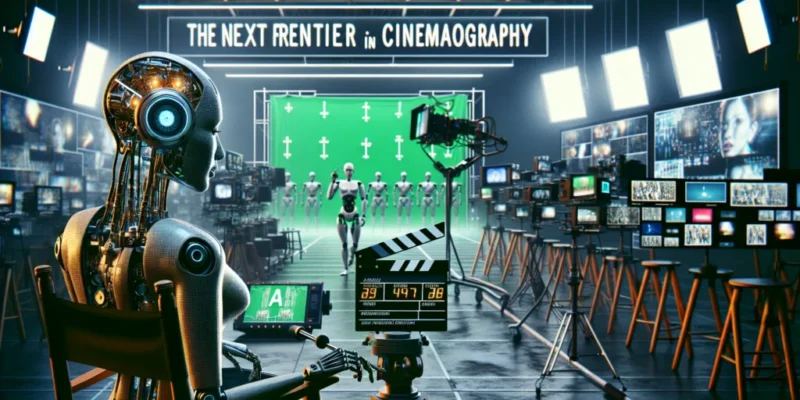🚀 The Future of Filmmaking is AI
Filmmaking has always been a blend of creativity, technology, and teamwork. But in recent years, artificial intelligence (AI) has begun to play a more significant role in the creative process. From writing scripts to editing scenes and generating special effects, AI is gradually becoming a key player in the film industry, offering filmmakers tools to streamline processes and push the boundaries of storytelling. Let’s explore how AI is transforming the filmmaking landscape in 2025.
✍️ AI Scriptwriting: A New Creative Partner
One of the most exciting applications of AI in filmmaking is its ability to assist in scriptwriting. AI-powered tools like ChatGPT, Sudowrite, and ScriptAI are now capable of generating entire scripts, suggesting dialogue, and even crafting plot twists.
Key Features:
-
Story Generation: AI can take a brief description and generate full storylines.
-
Dialogue Enhancement: Tools suggest better phrasing, emotional tones, and character-specific language.
-
Plot Consistency: AI analyzes structure and pacing to keep the narrative engaging.
🔍 Example: Sundance 2025 is expected to showcase films co-written with AI scripts, marking the first time major film festivals will recognize AI in screenwriting.
🎥 AI Video Editing: Cutting-Edge Efficiency
Video editing is one of the most time-consuming aspects of filmmaking. However, AI-powered editing tools like Adobe Sensei and Runway ML are making the process faster, more efficient, and more creative.
Key Features:
-
Automated Editing: AI analyzes hours of footage and automatically selects the best clips for the final cut.
-
Color Grading: AI adjusts color tones to match the desired aesthetic, saving time for the creative team.
-
Scene Transitions: AI can intelligently add transitions based on the rhythm and pace of the footage.
🕒 Example: Editing that used to take weeks now takes days, thanks to AI’s ability to analyze and compile footage quickly.
💡 AI in Visual Effects (VFX)
Creating stunning visual effects (VFX) has always been one of the most labor-intensive and costly aspects of filmmaking. With AI, VFX artists can now create realistic environments and characters more efficiently than ever.
Key Features:
-
AI-Driven Simulation: AI helps simulate realistic environments, from fire and water to crowds and weather effects.
-
Deep Learning for CGI: AI can generate photorealistic human faces and characters, reducing the need for manual animation.
-
Motion Capture Enhancement: AI improves the accuracy of motion capture technology, allowing actors to portray more realistic movements.
🌟 Example: Major blockbuster films like The Matrix Resurrections have already begun using AI to create hyper-realistic VFX on a budget and at scale.
🤖 AI for Sound Design and Music
AI is also reshaping the sound design process. Tools like Aiva and Amper Music allow filmmakers to compose original soundtracks and enhance sound effects, tailored to the mood of each scene.
Key Features:
-
AI-Generated Music: Filmmakers can input scene descriptions, and AI will generate music that matches the desired emotional tone.
-
Sound FX Optimization: AI optimizes sound effects by analyzing the visuals and adjusting sound layers in real-time.
-
Speech Synthesis: AI can create realistic voices for characters that haven’t been voiced by human actors.
🎶 Example: AI composers are already working alongside music directors to create scores that match complex film narratives in a fraction of the time.
🌍 AI in Distribution and Marketing
AI doesn’t just stop at production; it’s also making waves in how films are marketed and distributed. Platforms like Netflix and Amazon Prime use AI to analyze viewer behavior and suggest personalized movie recommendations.
Key Features:
-
Predictive Analytics: AI can predict which films will perform well at the box office based on historical data.
-
Targeted Advertising: AI creates personalized ad campaigns for films, reaching the right audience with the right messaging.
-
Audience Engagement: AI analyzes audience feedback and adjusts promotional content accordingly.
📈 Example: AI-powered marketing strategies are becoming the norm for major studios and streaming services to boost viewership and optimize release schedules.
🎬 The Ethics of AI in Filmmaking
With all the benefits of AI, there are also concerns regarding the ethical implications of its use in creative industries. From the replacement of jobs to the potential for AI-generated content that blurs the line between reality and fiction, the industry must tread carefully.
Key Ethical Concerns:
-
Job Displacement: As AI handles more creative tasks, concerns grow about the displacement of jobs in screenwriting, editing, and VFX.
-
Copyright Issues: Who owns the rights to AI-generated content? The filmmaker, the AI tool developer, or someone else entirely?
-
AI Bias: AI tools are trained on data, which could perpetuate biases present in that data, impacting storytelling and representation.
🎬 Conclusion: The Future of AI in Filmmaking
AI is no longer just a futuristic concept—it’s already here, reshaping every aspect of the filmmaking process. From scriptwriting and editing to visual effects and marketing, AI tools are becoming indispensable for filmmakers looking to stay ahead in a fast-evolving industry. However, as AI continues to evolve, so too must our understanding of its ethical implications. The future of AI in filmmaking is exciting, and we are just beginning to scratch the surface.




Comments